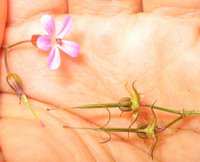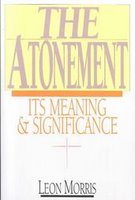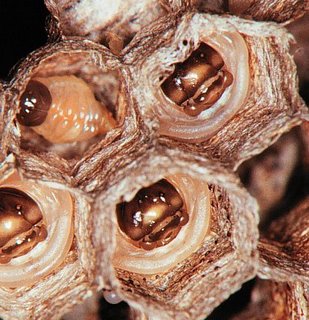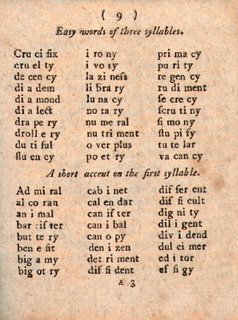
In a former life, I spent a lot of time on theology discussion boards. You don't have to be on discussion boards long before you realize that there are a few standard oft-repeated, but mostly meaningless, rebuttal phrases. The purpose of these particular sorts of rebuttals is to be such shocking accusations that no additional response is needed. I thought it would be interesting to consider a couple of them.
First up is the
God in a box rebuttal. The discussion in which this phrase is used usually goes something like this: Someone makes a propositional statement about God that doesn't sit well with someone else, but instead of giving a reason that the statement about God is wrong, the person who disagrees trots out this all-purpose propositional-statement-about-God rebuttal, "You can't put God in a box like that!"
Of course, part of that statement is always right. We
can't put God in a box. God is
infinite, and our statements and ideas about him will never contain the whole of who he is. He is
other, and in a category completely separate from us, and not exactly like anything we know or are able to experience. He is
creator--the one who created us and created the box we exist in--and as boxees, we will never succeed at packaging the packager.
Nope, the problem with that rebuttal statement is not so much with the "You can't put God in a box" part, but with the "like that!" part. Sometimes those words are an objection to any definite statement about God, coming from the idea that God is so beyond us, so mysterious, that we can know nothing much truly true about him. Definite statements about God make some people really, really, nervous. They have the idea that since much of who God is is beyond the realm of our comprehension, any statement about him necessarily is false, in the sense that it reduces him to less than he is by attempting to contain an infinite God in a statement (or set of statements) about him.
More often than not, though, the objection isn't that we can know nothing about God, but that the particular statement doesn't jibe with the objector's idea of God. God, as they understand him, isn't "like that!"
Often this objection arises when someone says that God
can't do something or
must do something. Statements like this are seen as limiting God, and don't we all know that God is completely free? There are no rules or standards that God must conform his actions to, and no limitations on his abilities, so how can it ever be right to say that God can't or God must?
It is, of course, true that God is completely free. He's the only truly free being there is. Unlike any other being, he is entirely free to express himself, and if you think about it, that's what true freedom is, isn't it? It's when we can't "be ourselves" that we feel our freedom is restricted. But God has freedom to be himself in a way that no other being does. Absolutely nothing stands in the way of his self-expression, but it's
himself he's expressing, and he isn't anyone-or-anything-at-all, he's
someone. He has characteristics, so when he expresses himself, he expresses himself according to his characteristics, and that's not limiting, that's freedom.
And while it is correct to say that the whole of God is incomprehensible to us, there are things about him that we can understand, and there are some understandable things about himself that he's chosen to communicate to us, so it's not correct to think that we can know nothing truly true about him. While we can't box him up, he's given us hooks we can hang our hats on.
One of the most important hooks that God has given us is the hook of his immutability, because that characteristic ensures the constancy of the other characteristics. God's character is unchanging. He is who he is, and who he was, and who he will be, and he isn't going to morph into something or someone else tomorrow, or ever. If he tells us he is truthful, then he is always truthful. His immutability makes his truthfulness an everlasting hook to hang our hats on, too. It's because of this that we are not limiting God when we say he can't lie. We are not saying that there is a set of rules (including "don't lie!") outside of himself that he must always live up to, even though he feels like lying. Nope, we are affirming his perfect ability to be who he is, forever, freely; and to speak and act in accordance with who he is and what he wants, forever, freely.
Sometimes the God in the box objection comes in slightly different form, but it all boils down to the same idea. For example, in
the first comment on this post at
Jollyblogger, an objection is made to the idea of penal substitutionary atonement. The idea of a penal substitutionary atonement, says the commentor,
suggests that once the Father has made a law, that He is unable to subsequently be merciful until that law if fulfilled. That makes God's law more powerful than God.
If I understand the commenter correctly, her objection is to the idea that sin must always be given its just deserts, as if the just deserts for sin comes from a rule God set up outside of himself, and if he always has to go by his own rule, God is limited. This is really just another form of the God in a box objection--that any
must or
can't statements pertaining to God are limits to God's freedom. In this particular case, it isn't that God made a rule that he must always make sure sin receives what it deserves, but rather, that God exists as a God who is characteristically just. Expressing himself fully and freely means that he always gives justice to sin, and if he didn't he wouldn't be who he is. Therefore, he cannot simply pass over sin out of mercy for sinners, but his mercy must be given in a way that is also just.
Of course, there are things for which the objection of
boxing God might rightly be made. Whatever limits we speak of in regards to what God can do, if they are not limits that arise directly from the specific characteristics he's revealed and explained to us through his word, then, in a sense, we are trying to put God in a box. If I were to tell you that God was confined to one place at one time, that'd be making God out to be less than he has revealed himself to be, and boxing him in that way. I still don't think that "You can't put God in a box like that!" is nearly as good a response as giving evidence that God has revealed himself to be a both a transcendent and immanent God.
Next up, the oft repeated rebuttal, "You're making God the author of sin!"

 Instead of an overhead photo of the whole garden this week, how about a shot of some of the produce? Once the plants grow large enough to fill the garden up, you won't see much difference in the overhead photo, anyway.
Instead of an overhead photo of the whole garden this week, how about a shot of some of the produce? Once the plants grow large enough to fill the garden up, you won't see much difference in the overhead photo, anyway.


























